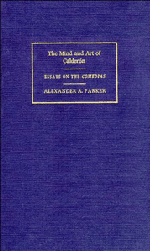Epilogue
Published online by Cambridge University Press: 05 February 2012
Summary
In 1976 Manuel Durán and Roberto González Echeverría published in two volumes an anthology of Calderonian criticism entitled Calderón y la crítica: historia y antología (Madrid: Gredos 1976). A reviewer of this anthology stated that: ‘Calderón the dramatist disappears from view under the weight of Calderón the thinker and moralist’. It may be that similar criticism could be made of this book; for after all Calderón did have a philosophical cast of mind and a strong ethical sense, whereas these pages have not laid much emphasis on Calderón as a technician of the stage. But what exactly does this distinction mean? It cannot mean that the purpose of existence, the workings of human psychology, and the problems of Good and Evil are not relevant to poetic drama. It must somehow be a question of the right balance between what the reader's mind makes of human problems and the way a dramatist manipulates the human figures of a plot within the framework of a fixed stage. There are different ways of reading plays, which will differ according to the reader's temperaments and dominant interests. The reader whose interest lies primarily in plays as spectacles will, as he reads, visualise the stage action in his imagination, seeing how it would work out on the stage if he were the producer.
- Type
- Chapter
- Information
- The Mind and Art of CalderónEssays on the Comedias, pp. 360 - 366Publisher: Cambridge University PressPrint publication year: 1989

